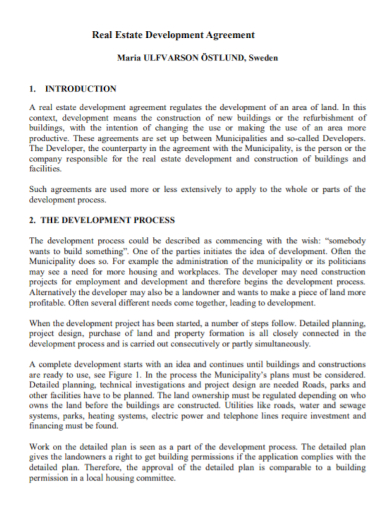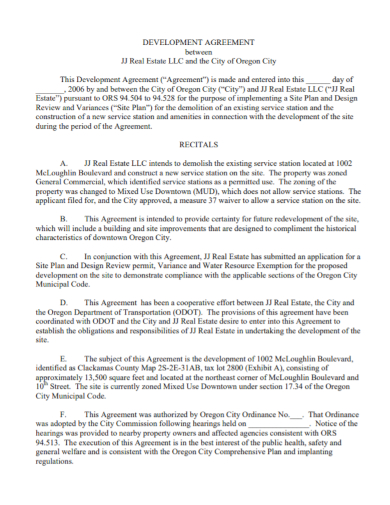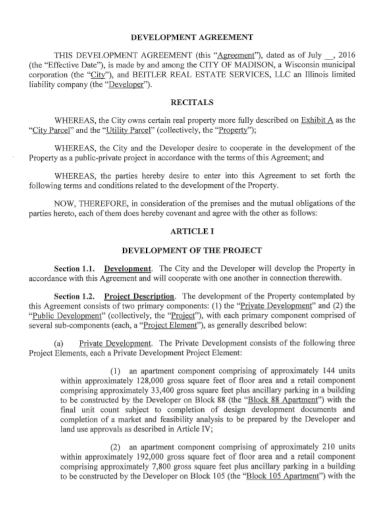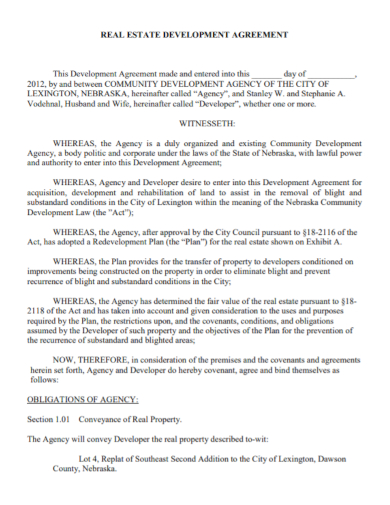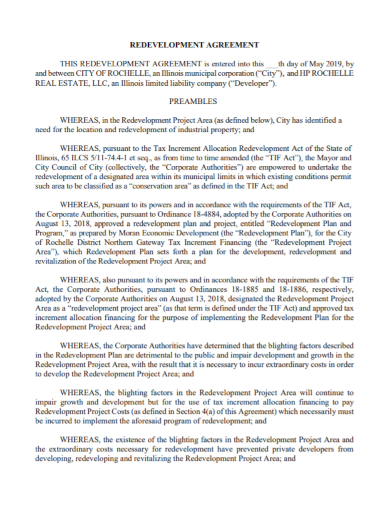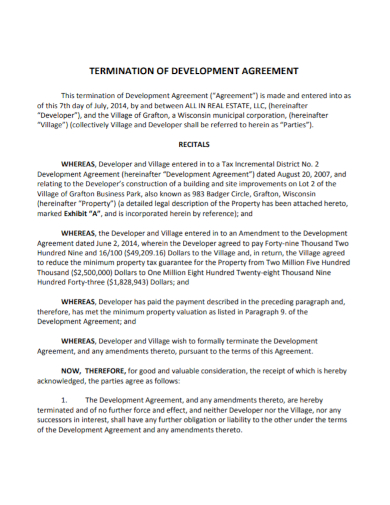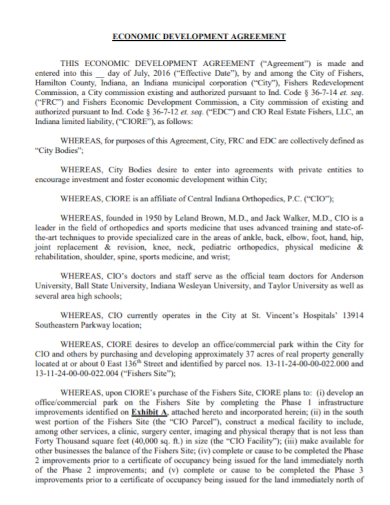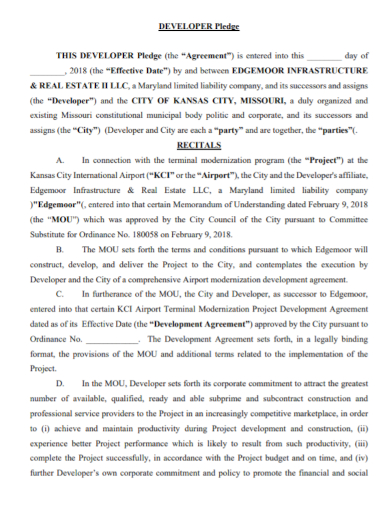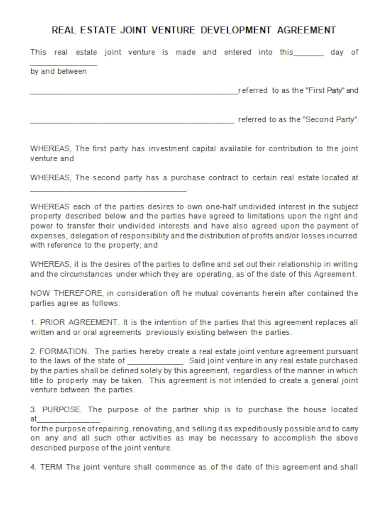9+ Real Estate Development Agreement Samples
Real estate development, or property development, is a business process, encompassing activities that range from the renovation and re-lease of existing buildings to the purchase of raw land and the sale of developed land or parcels to others. This involves a lot of transactions and legalities along its process. To document and secure the statements of the parties involved, there needs to have a Real Estate Development Agreement. In making this from scratch, you might be stuck in the process of dealing with how difficult it is. To aid you with this, our site offers you free, available, ready-made and customizable templates that you can utilize in your agreement needs. Just browse among these templates and choose the one that satisfies your needs the most.
For other agreement templates, our site is offering you these agreement templates that you can utilize when needed: Employee Equipment Agreement, Vendor Purchase Agreement, Vendor Merchandise Agreement, Vendor Service Agreement, Training Services Agreement, Teacher Agreement, Workshop Service Agreement, Student Teaching Agreement, Product Sales Agreement, Farm Land Lease Agreement, etc. This article will not only give you templates but also necessary information that you need to know for your agreement. So come on, explore this article with me!
1. Real Estate Development Agreement Template
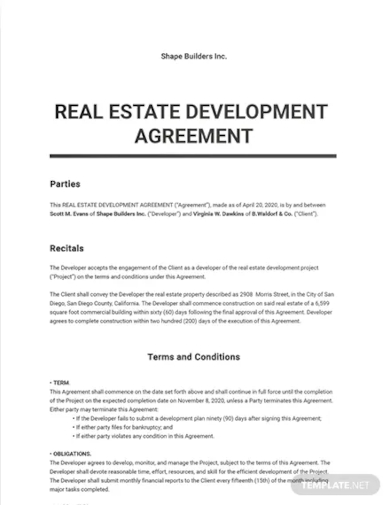
2. Real Estate Development Agreement
3. Sample Real Estate Development Agreement
4. Real Estate Services Development Agreement
5. Real Estate Agency Development Agreement
6. Real Estate Redevelopment Agreement
7. Real Estate Termination of Development Agreement
8. Real Estate Economic Development Agreement
9. Real Estate Developer Pledge Agreement
10. Real Estate Joint Venture Development Agreement
Real Estate Development
Real estate development is a multi-step process that can be complicated, lengthy and risky. It can take years to bring a project from the initial planning stage through construction to final completion, and there are plenty of obstacles that can pop up along the way. Yet development projects also can be highly profitable investment opportunities. By definition, development projects provide the opportunity to deliver a product that does not currently exist into a market, often providing the fresh new supply to satisfy pent-up market demand. When executed well, this aspect of a development project can translate into a runaway success story, something that simply isn’t nearly as possible with an existing asset. Investors can more confidently assess some of the risks associated with construction by better understanding the “life cycle” of a development project.
Real Estate Development Process
Early Stage: Pre Development
The early stage of a project focuses on due diligence, research, and permitting. It is often the most variable in duration. Investing at this stage carries the greatest and most varied risks because there are many unknowns. Some of the common steps in this phase include:
-
Market analysis and feasibility studies
-
Land acquisition or securing option rights to purchase land
-
Environmental assessments
-
Surveys
-
Site plans, development plans, and building plans
-
Permitting
-
Some infrastructure improvements
-
Arranging construction financing
Because this stage is the riskiest, pre-development work is usually financed by the project sponsor or a source of seed equity that might get taken out by the construction loan. Investments made during this stage, therefore, provide for higher returns than those made during the later stages. One important note for equity investors is that obtaining construction financing from a bank or other lender is a very rigorous process, and if a developer alre
Middle Stage: Construction
The middle stage involves constructing the improvements. Since the pre-development tasks have been completed, the project risks at this stage are greatly reduced but certainly not eliminated. Some of the common steps in this stage include:
-
Vertical construction
-
Project marketing
-
Drawing on construction financing
-
Pre-leasing
-
Arranging permanent financing (if not done during pre-development)
-
Arranging for the property manager (if not done during pre-development)
The project typically is financed at this stage by the sponsor, outside investors, and a short-term construction loan. Often, the debt is distributed to the developer in increments called “draws” upon the achievement of construction milestones. Investments and loans made during this stage generally provide lower returns than pre-development investments but higher returns than those made for fully constructed or stabilized buildings.
The certificate of occupancy generally marks the end of the construction phase and allows for the commencement of property operations. Like the building permit, it is based upon objective criteria regarding construction quality and is a fairly administrative process.
Final Stage: Operation
The final stage of the development process, operation, is the first stage of the building’s life. While the pre-development and construction risks may be removed by this point, obtaining tenants is still at risk. Some activities during the final stage include:
-
Ongoing marketing and leasing
-
Finding a buyer, if not done earlier
-
Determining a hold strategy, if not selling
-
Ramping up property management
-
Achieving stabilization
The project is typically financed at this stage with construction financing or another round of short-term “bridge” financing until the project reaches a threshold called “stabilization,” which is typically defined as a certain occupancy level (perhaps 90% or better) for a certain duration (perhaps three consecutive months). Upon stabilization, so-called “permanent” or long-term financing can be placed and used to take out construction financing. Depending upon the amount of pre-leasing that was accomplished during construction, this can be the least risky stage. For this reason, permanent loans and equity investments will provide the lowest returns.
FAQs
What does a real estate developer do?
Specifically, real estate developers buy property or partner with landowners, then develop a plan for what to build or rebuild on that property. They bring in investors and predict how much money the new homes or businesses will bring in. Developers then manage the construction and ultimately sell the project.
What do you study in real estate development?
You should plan to get your real estate license. It’s also helpful to have a bachelor’s degree in real estate, business, finance or a related field. The ability to plan and organize projects, general knowledge of real estate and an entrepreneurial mindset are all important skills to become a real estate developer.
Having this document might be a hard task for you especially if you are doing it from scratch so as it needs to consider a lot of legalities that should be in lined with the law.. To avoid this, you are highly encouraged to avail resources that you can see online to make your work, easy, convenient and quality-made. So what are you waiting for? Avail our templates now!
Related Posts
FREE 26+ Investment Agreement Samples in PDF | MS Word | Google Docs | Pages
Agreement Between Two Parties For Money Samples & Templates
Land Purchase Agreement Samples & Templates
Sample Business Agreement between Two Parties
FREE 10+ Trial Agreement Samples In MS Word | Google Docs | Apple Pages | PDF
FREE 9+ Shop Rental Agreement Samples [ Commercial, Lease, Tenancy ]
FREE 10+ Charter Agreement Samples In MS Word | Google Docs | Apple Pages | PDF
FREE 10+ Mentoring Agreement Samples In MS Word | Apple Pages | PDF
FREE 10+ Partner Agreement Samples In MS Word | Google Docs | Apple Pages | PDF
FREE 10+ Individual Agreement Samples In MS Word | Google Docs | Apple Pages | PDF
FREE 10+ Strategic Agreement Samples In MS Word | Google Docs | Apple Pages | PDF
FREE 10+ Equity Agreement Samples In MS Word | Google Docs | Apple Pages | PDF
FREE 10+ Producer Agreement Samples in MS Word | Apple Pages | PDF
FREE 10+ Grant Agreement Samples In MS Word | Apple Pages | PDF
FREE 8+ Meeting Agreement Samples in MS Word | Google Docs | Apple Pages | PDF

